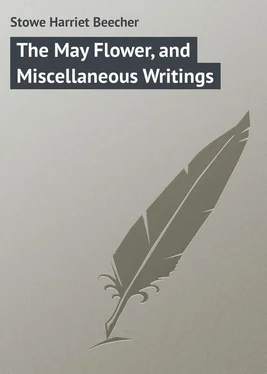Harriet Stowe - The May Flower, and Miscellaneous Writings
Здесь есть возможность читать онлайн «Harriet Stowe - The May Flower, and Miscellaneous Writings» — ознакомительный отрывок электронной книги совершенно бесплатно, а после прочтения отрывка купить полную версию. В некоторых случаях можно слушать аудио, скачать через торрент в формате fb2 и присутствует краткое содержание. Жанр: foreign_prose, на английском языке. Описание произведения, (предисловие) а так же отзывы посетителей доступны на портале библиотеки ЛибКат.
- Название:The May Flower, and Miscellaneous Writings
- Автор:
- Жанр:
- Год:неизвестен
- ISBN:нет данных
- Рейтинг книги:4 / 5. Голосов: 1
-
Избранное:Добавить в избранное
- Отзывы:
-
Ваша оценка:
- 80
- 1
- 2
- 3
- 4
- 5
The May Flower, and Miscellaneous Writings: краткое содержание, описание и аннотация
Предлагаем к чтению аннотацию, описание, краткое содержание или предисловие (зависит от того, что написал сам автор книги «The May Flower, and Miscellaneous Writings»). Если вы не нашли необходимую информацию о книге — напишите в комментариях, мы постараемся отыскать её.
The May Flower, and Miscellaneous Writings — читать онлайн ознакомительный отрывок
Ниже представлен текст книги, разбитый по страницам. Система сохранения места последней прочитанной страницы, позволяет с удобством читать онлайн бесплатно книгу «The May Flower, and Miscellaneous Writings», без необходимости каждый раз заново искать на чём Вы остановились. Поставьте закладку, и сможете в любой момент перейти на страницу, на которой закончили чтение.
Интервал:
Закладка:
"O, do not say so," said James; "think, think what you have done, if only for me . God bless you for it! God will bless you for it; it will follow you to heaven; it will bring me there. Yes, I will do as you have taught me. I will give my life, my soul, my whole strength to it; and then you will not have lived in vain."
George smiled, and looked upward; "his face was as that of an angel;" and James, in his warmth, continued, —
"It is not I alone who can say this; we all bless you; every one in this place blesses you; you will be had in everlasting remembrance by some hearts here, I know."
"Bless God!" said George.
"We do," said James. "I bless him that I ever knew you; we all bless him, and we love you, and shall forever."
The glow that had kindled over the pale face of the invalid again faded as he said, —
"But, James, I must, I ought to tell my father and mother; I ought to, and how can I?"
At that moment the door opened, and Uncle Lot made his appearance. He seemed struck with the paleness of George's face; and coming to the side of the bed, he felt his pulse, and laid his hand anxiously on his forehead, and clearing his voice several times, inquired "if he didn't feel a little better."
"No, father," said George; then taking his hand, he looked anxiously in his face, and seemed to hesitate a moment. "Father," he began, "you know that we ought to submit to God."
There was something in his expression at this moment which flashed the truth into the old man's mind. He dropped his son's hand with an exclamation of agony, and turning quickly, left the room.
"Father! father!" said Grace, trying to rouse him, as he stood with his arms folded by the kitchen window.
"Get away, child!" said he, roughly.
"Father, mother says breakfast is ready."
"I don't want any breakfast," said he, turning short about. "Sally, what are you fixing in that 'ere porringer?"
"O, it's only a little tea for George; 'twill comfort him up, and make him feel better, poor fellow."
"You won't make him feel better – he's gone," said Uncle Lot, hoarsely.
"O, dear heart, no!" said Aunt Sally.
"Be still a' contradicting me; I won't be contradicted all the time by nobody. The short of the case is, that George is goin' to die just as we've got him ready to be a minister and all; and I wish to pity I was in my grave myself, and so – " said Uncle Lot, as he plunged out of the door, and shut it after him.
It is well for man that there is one Being who sees the suffering heart as it is , and not as it manifests itself through the repellances of outward infirmity, and who, perhaps, feels more for the stern and wayward than for those whose gentler feelings win for them human sympathy. With all his singularities, there was in the heart of Uncle Lot a depth of religious sincerity; but there are few characters where religion does any thing more than struggle with natural defect, and modify what would else be far worse.
In this hour of trial, all the native obstinacy and pertinacity of the old man's character rose, and while he felt the necessity of submission, it seemed impossible to submit; and thus, reproaching himself, struggling in vain to repress the murmurs of nature, repulsing from him all external sympathy, his mind was "tempest-tossed, and not comforted."
It was on the still afternoon of the following Sabbath that he was sent for, in haste, to the chamber of his son. He entered, and saw that the hour was come. The family were all there. Grace and James, side by side, bent over the dying one, and his mother sat afar off, with her face hid in her apron, "that she might not see the death of the child." The aged minister was there, and the Bible lay open before him. The father walked to the side of the bed. He stood still, and gazed on the face now brightening with "life and immortality." The son lifted up his eyes; he saw his father, smiled, and put out his hand. "I am glad you are come," said he. "O George, to the pity, don't! don't smile on me so! I know what is coming; I have tried, and tried, and I can't , I can't have it so;" and his frame shook, and he sobbed audibly. The room was still as death; there was none that seemed able to comfort him. At last the son repeated, in a sweet, but interrupted voice, those words of man's best Friend: "Let not your heart be troubled; in my Father's house are many mansions."
"Yes; but I can't help being troubled; I suppose the Lord's will must be done, but it'll kill me."
"O father, don't, don't break my heart," said the son, much agitated. "I shall see you again in heaven, and you shall see me again; and then 'your heart shall rejoice, and your joy no man taketh from you.'"
"I never shall get to heaven if I feel as I do now," said the old man. "I cannot have it so."
The mild face of the sufferer was overcast. "I wish he saw all that I do," said he, in a low voice. Then looking towards the minister, he articulated, "Pray for us."
They knelt in prayer. It was soothing, as real prayer always must be; and when they rose, every one seemed more calm. But the sufferer was exhausted; his countenance changed; he looked on his friends; there was a faint whisper, "Peace I leave with you" – and he was in heaven.
We need not dwell on what followed. The seed sown by the righteous often blossoms over their grave; and so was it with this good man. The words of peace which he spoke unto his friends while he was yet with them came into remembrance after he was gone; and though he was laid in the grave with many tears, yet it was with softened and submissive hearts.
"The Lord bless him," said Uncle Lot, as he and James were standing, last of all, over the grave. "I believe my heart is gone to heaven with him; and I think the Lord really did know what was best, after all."
Our friend James seemed now to become the support of the family; and the bereaved old man unconsciously began to transfer to him the affections that had been left vacant.
"James," said he to him one day, "I suppose you know that you are about the same to me as a son."
"I hope so," said James, kindly.
"Well, well, you'll go to college next week, and none o' y'r keepin' school to get along. I've got enough to bring you safe out – that is, if you'll be car'ful and stiddy ."
James knew the heart too well to refuse a favor in which the poor old man's mind was comforting itself. He had the self-command to abstain from any extraordinary expressions of gratitude, but took it kindly, as a matter of course.
"Dear Grace," said he to her, the last evening before he left home, "I am changed; we both are altered since we first knew each other; and now I am going to be gone a long time, but I am sure – "
He stopped to arrange his thoughts.
"Yes, you may be sure of all those things that you wish to say, and cannot," said Grace.
"Thank you," said James; then, looking thoughtfully, he added, "God help me. I believe I have mind enough to be what I mean to; but whatever I am or have shall be given to God and my fellow-men; and then, Grace, your brother in heaven will rejoice over me."
"I believe he does now ," said Grace. "God bless you, James; I don't know what would have become of us if you had not been here."
"Yes, you will live to be like him, and to do even more good," she added, her face brightening as she spoke, till James thought she really must be right.
It was five years after this that James was spoken of as an eloquent and successful minister in the state of C., and was settled in one of its most thriving villages. Late one autumn evening, a tall, bony, hard-favored man was observed making his way into the outskirts of the place.
Читать дальшеИнтервал:
Закладка:
Похожие книги на «The May Flower, and Miscellaneous Writings»
Представляем Вашему вниманию похожие книги на «The May Flower, and Miscellaneous Writings» списком для выбора. Мы отобрали схожую по названию и смыслу литературу в надежде предоставить читателям больше вариантов отыскать новые, интересные, ещё непрочитанные произведения.
Обсуждение, отзывы о книге «The May Flower, and Miscellaneous Writings» и просто собственные мнения читателей. Оставьте ваши комментарии, напишите, что Вы думаете о произведении, его смысле или главных героях. Укажите что конкретно понравилось, а что нет, и почему Вы так считаете.












